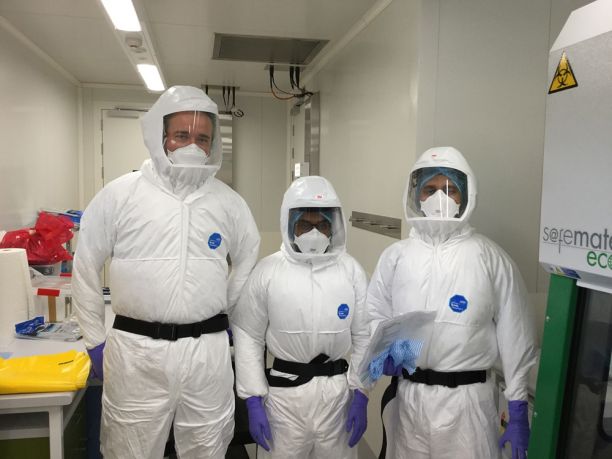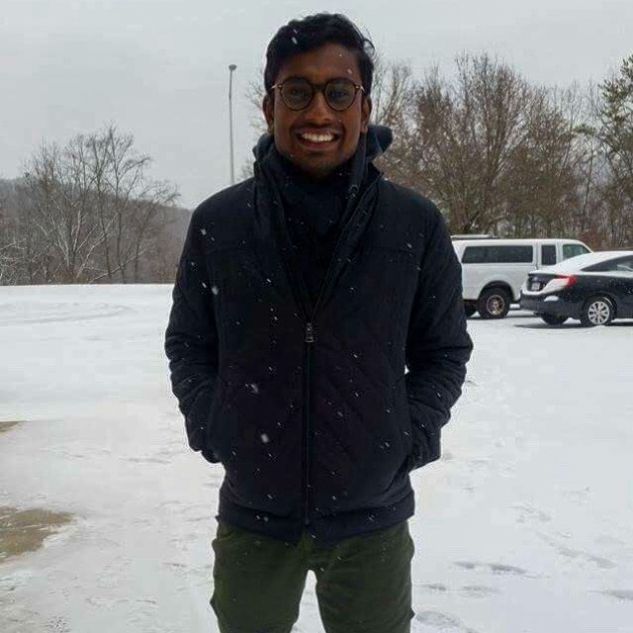Written By
Janine Lucas
College
College of Medicine and Dentistry
Publish Date
2 February 2022
Related Study Areas
James Cook University graduate Dr Visai Muruganandah worked on a new vaccine for tuberculosis during a medical degree that took him from Tennessee to Thursday Island.
After the third year of his Bachelor of Medicine, Bachelor of Surgery, Dr Muruganandah joined JCU Senior Research Fellow Dr Andreas Kupz's ground-breaking TB vaccine development program in Cairns to complete a Bachelor of Medical Science (Honours).
“It’s fair to say that Visai has achieved more in his one year of research than what many PhD students achieve in four years,” says Dr Kupz, whose team has created a potential replacement for the century-old TB vaccine.
Visai, a Melbourne High School graduate, was awarded the University Medal for outstanding academic achievement in coursework and research at an undergraduate level. This year, while interning at Royal Brisbane and Women’s Hospital, he will complete the Master of Public Health and Tropical Medicine he has been studying concurrently through JCU.


Word-class mentoring
“The science behind vaccines and how they work, coupled with the fact that they are arguably one of the best public health interventions known to mankind, fascinated me since high school,” Visai says.
“I had always wanted to be involved in research to develop vaccines against one of the ‘Big Three’ infectious diseases of global health importance: TB, HIV and malaria. When the opportunity to train in vaccine research under an internationally recognised leader in TB vaccine science arose, it was a no-brainer.”
The one-year Bachelor of Medical Science (Honours) is available to medical students after they have completed the first three years of their Bachelor of Medicine, Bachelor of Surgery. JCU MBBS students are able to take one year out of the degree to complete a full-time research project before rejoining the MBBS. This is just one of the Honours pathways available to JCU students wishing to gain hands-on research experience during their medical degree.


Phenomenal Honours research output
Dr Kupz says Visai’s exceptional work in the TB vaccine development program has contributed to the team’s recent grant success. Dr Kupz’s group received grants totalling almost $8 million from the Bill & Melinda Gates Foundation, The National Institutes of Health USA and the National Health and Medical Research Council to further develop the vaccine, compare it to other vaccine candidates from around the world and to gain a better understanding of TB.
“Visai’s Honours project focused on understanding the importance of pairing genetically modified tuberculosis vaccines with different routes of delivery,” Dr Kupz says. “This research led to an internationally accepted model to compare vaccine strategies and it was published as a first-author manuscript in the prestigious international journal Science Advances.
“During his Honours year, Visai also performed a comprehensive review on the role of tissue resident memory T cells in infectious diseases and how these cells can be targeted by vaccination. This literature review was published in Frontiers in Immunology.”
Visai was awarded a Far North Queensland Hospital Foundation research grant of $5,000 and an AMUTHAN Medical Research Bursary during his time with Dr Kupz’s group.
“In addition to these outstanding achievements, he was involved in various other projects related to TB vaccine development and the testing of novel antimicrobial compounds derived from tropical plants. These side projects led to three further research publications in PNAS, Vaccine and Journal of Natural Products as well as a further review article in Clinical Translational Immunology.
Visai returned to Dr Kupz’s lab during a 10-week research elective in 2021 as part of the final year of his medical degree. “In this short time, he produced another fabulous review article, which has just been accepted in the journal International Immunology,” Dr Kupz says. “Publishing seven articles in such high-profile journals as part of an honours project is absolutely phenomenal. I would take him back into my group at any time.”
Visai is working on another research project with paediatrician Dr Thomas Volkman, looking into the utility of the Quantiferon Gold test for diagnosing tuberculosis infection in young children. “Currently it is a topic of contention, and hopefully this project will bring some clarity,” he says.
‘I couldn't think of a better way to finish medical school’
As a recipient of the Lynn Kratcha Bursary, Visai spent a month in Tennessee in the United States during the second year of his medical degree. In Year 5, he was awarded the RACGP North Queensland Prize, which came with the opportunity to attend the 62nd RACGP Queensland Clinical Update in Brisbane in 2021.
His final clinical placement was a Thursday Island rural term, which he described as extraordinary. “Something that has stuck with me is the fact that huge differences can be made in people’s lives and even entire communities without the need for highly specialised and state-of-the-art facilities,” he says. “The work that can be done in a consulting room by a primary care doctor can prevent life-threatening conditions that would otherwise require thousands of dollars' worth of highly specialised equipment and personnel to treat. This was particularly evident during my time on Thursday Island.”
“One of my favourite experiences was going on primary care outreach clinics to the outer islands of the Torres Strait. Each island is like its own tropical paradise, and I feel privileged to have had the opportunity to be involved with delivering much-needed primary care to the culturally rich and beautiful communities of the Torres Strait. I couldn't think of a better way to finish medical school.”


Inspiration from graduates
He says the key advantage of being a JCU medical student is the opportunity to train in rural and remote places. “All students are required to complete a mandatory 20 weeks of ‘rural’. During these placements, students live and work within a rural or remote community, gaining invaluable experience that cannot be replicated in major tertiary hospitals. It gives students the opportunity to practise procedural skills and take on additional clinical responsibilities that replicate the life of a junior doctor.”
He says the JCU program’s focus on rural and remote medicine, Aboriginal and Torres Strait Islander health and tropical medicine makes it unique.
“As a socially accountable medical school, the program also aims to create a workforce that serves the needs of the community by tackling key social determinants of health,” he says.
“Seeing the difference that previous graduates have made in communities across the country and even overseas is truly inspiring.”
Visai is interested in a broad range of specialties including general practice, public health, adult medicine and paediatrics. “Regardless of which specialty I choose, I hope to combine clinical medicine with my passion for research and public health, perhaps continuing to work in the field of vaccines,” he says.
He says completing a medical degree is just the beginning: “My advice to prospective medical students is to explore a wide variety of interests inside and outside of medicine, and to keep an open mind. The ways in which you can use a medical degree to help people are endless.”
James Cook University is a leader in tropical health and medicine. Find out more about how our research makes a difference to global health.